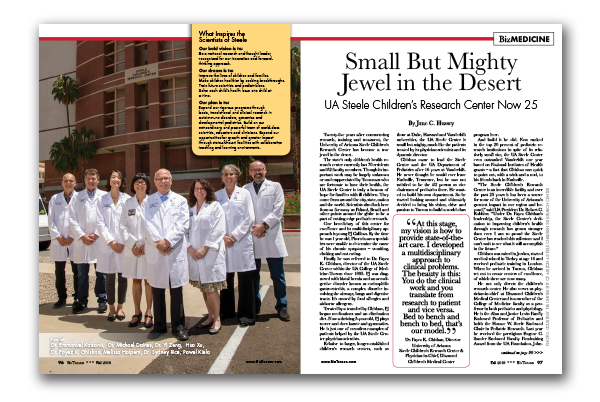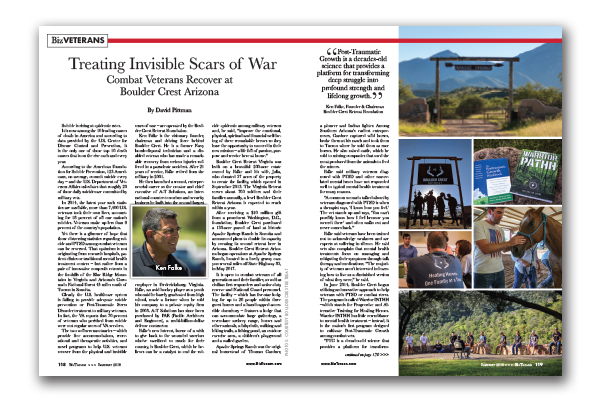
Building on Sinfonía’s Success – Adding Medication Management to Home Healthcare
By Eric Swedlund –
A spinoff from the University of Arizona’s College of Pharmacy is bringing millions of clients to Sinfonía HealthCare Corp and has already tripled the nascent company’s revenues to more than $24 million.
Developed at the UA, the medication management software behind SinfoníaRx is at the core of a novel business model that searches out potential red flags with prescription medications and then routes problems to a call center staffed with pharmacists to provide corrective consultations.
At the time of the license to SinfoníaRx, the program and the technology were likely “the most mature” the university has ever launched, according to UA’s Tech Launch Arizona, which moves inventions, technologies and intellectual property from the laboratory into the marketplace.
Dr. Kevin Boesen, SinfoníaRx CEO, founded the Medication Management Center in 2006 as an assistant professor at the UA’s College of Pharmacy. The initial focus was on Medicare, which had just launched its prescription drug benefit plan.
“The way we do it is the most comprehensive way that you can do it,” Boesen said. “Every time a prescription is filled, that patient’s data is run through the set of algorithms and analyzed for safety, drug interactions, adherence, gaps in care and ways to reduce costs.”
Based on that assessment, about 50 to 60 percent of patients have potential problems with medication and about half of those cases need intervention, Boesen said. Potential problems are flagged for outgoing calls, which the company’s pharmacists make to consult with patients.
“Patients have a lot of different doctors, and one of the things they do now that’s a relatively new phenomenon is go pharmacy shopping,” Boesen said.
Problems with medication management have become a serious issue. Drug-related problems come at a cost of $200 billion annually in the United States, and the leading cause of hospital readmissions is medication error.
“Healthcare is complicated. It’s confusing,” Boesen said. “It’s an opportunity to contain and reduce a lot of unnecessary healthcare costs.”
At the UA, the Medication Management Center needed help managing the surge in need and volume, particularly in terms of software development and patient outreach. Boesen started to look for commercialization partners three years ago. Interest came from venture capital firms on both coasts for a traditional spinout – but Boesen wanted to maintain the relationship with the UA.
“To have faculty making the patient calls and consultations offers credibility,” he said. “They wanted to take everything out, which probably would have meant leaving Tucson.”
Boesen met Fletcher McCusker shortly after McCusker launched Sinfonía and though initially the interest centered on adding the prescription management services for Sinfonía’s home-based patients, the talk soon turned to spinout potential.
“Fletcher really understood that vision. He’s always been a proud supporter of the UA and a big supporter of keeping businesses in Tucson – so he’s the ideal partner,” Boesen said.
McCusker founded Sinfonía in February 2013, a new venture to follow his work with Providence Service Corporation, which he began in 1997 and as chairman and CEO expanded into a billion-dollar-a-year national public company.
He started Sinfonía with the vision of creating a multifaceted home healthcare provider that works across the spectrum from nurses to hospice care. Medication management fit perfectly.
“With our geriatric patients, we know managing medications is a huge problem,” McCusker said. “Particularly with older people living independently at home, they often aren’t capable of managing their own medications. So we became enamored with this system.”
In the fall of 2012, UA President Ann Weaver Hart began a reorganization of the technology transfer operation, recruiting David N. Allen from the University of Colorado to direct Tech Launch Arizona. The Medication Management Center was the first university priority for privatization.
“We were the only local bidder and we bid as a joint venture,” McCusker said. “We spun out the administration, legal, marketing and customer service aspects – but the College of Pharmacy continues to man the call center and the UA is a huge shareholder. It’s nice that the UA is a research institution because they have unbelievable data to track results.”
McCusker hired an advertising agency and began to aggressively market the company, hosting conferences and traveling, even internationally, to recruit clients. The business exploded.
With the addition of SinfoníaRx in November 2013, Sinfonía has grown from 2 million patients to more than 7.5 million patients and revenue more than tripled in nine months – from $8 million to more than $24 million.
“The timing couldn’t be better given the Affordable Care Act and the interest in medications,” McCusker said. “Nobody was really looking at how those things interacted, interfered or combined. Now that’s a huge focus at every level.”
As the nation’s largest medication management company, SinfoníaRx has 5.9 million patients nationally, making 50,000 to 100,000 calls a week recommending changes in prescription management. SinfoníaRx expects to grow to 7 million patients by the end of 2015, Boesen said.
In addition to the 150-person UA call center, housed in the old Tucson Electric Power building at 220 W. Sixth St., SinfoníaRx has 20-person call centers at the UA health campus in downtown Phoenix and Ohio State University. The call center staff is composed of pharmacists, pharmacy technicians and pharmacy students, with more complex or more serious calls routed to the pharmacists. In order to operate nationwide, the call center is licensed as a pharmacy in all 50 states, a process that took 18 months to complete, Boesen said.
The process starts with the health plans. Some send data daily, while some send it weekly. After the software identifies potential problems, they’re categorized based on the level of urgency and the level of complexity. After the consultation, SinfoníaRx sends a summary and information on recommendations to the patient, to the provider and the health plan.
In terms of serious health risks, SinfoníaRx gets about 1,000 alerts each week about patients being prescribed two medications that should never be taken together, Boesen said.
SinfoníaRx still has huge opportunities to grow, Boesen said, with capacity for 20 million patients under the current call center levels. The software is scalable and the call center could still grow in Tucson and could also expand through other partnerships with top-tier pharmacy schools.
In addition to the medication management, the company calculates the return on investment in terms of healthcare cost savings. By tracking the implementation of recommendations and prevention of adverse events, the company projects the cost savings for every intervention. In the first quarter of 2014, that amounted to $29 million. Since moving to Sinfonía, the savings have topped more than $250 million.
“The people driving this are big managed-care payers. We just showed up and said ‘This is what we do’ and we’ve landed several large new contracts within the last nine months,” McCusker said.
Maintaining a partnership with SinfoníaRx is also a boon to the UA. One hundred pharmacy students enter the UA each year and over the last nine program years, hundreds have been trained in medication management.
“It brings a lot of notoriety to the College of Pharmacy,” Boesen said. “We’ve done national and international speaking. And the way we do the volume we can do, we’ve had interest from other countries – particularly Saudi Arabia, Canada and New Zealand.”
Both McCusker and Boesen are optimistic about the prospects for SinfoníaRx.
“There are a number of things people like,” McCusker said. “We kept it in Tucson. We kept it downtown. And there’s still plenty of opportunity for us to expand.”





